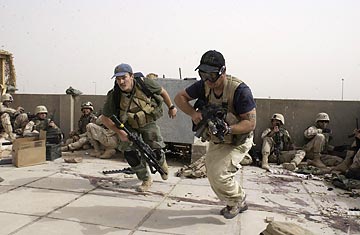
Plainclothes contractors working for Blackwater USA take part in a firefight in Najaf, Iraq.
Did the CIA use mercenaries for a covert (if ultimately fruitless) program to hunt down and kill al-Qaeda leaders? Despite sensational claims in today's New York Times and Washington Post, the Agency continues to maintain omerta on the secret program, which Director Leon Panetta cancelled in late June. But former CIA hands, including Panetta's predecessor Michael Hayden, are rallying to its defense.
They point out that all of the intelligence agencies routinely use outside contractors, especially since the terrorist attacks of 9/11. Hayden, director from 2006-09, defended the practice at a National Press Club event today, arguing that it makes sense to seek specialized skills where they are available — whether in the government or in the public sector. "We generally want to use the best athlete available in the draft," he said.
Although he wouldn't directly comment about what role contractors played in the program, he pointed out that under the guidelines of the White House's Office of Management and Budget (OMB), the Agency is allowed to use contractors for intelligence analysis and collection. The CIA has declined to comment on whether it brought the private security Blackwater, now known as Xe Services, into the secret program, much less what role the firm played.
Hayden and Michael Chertoff, the former Secretary for Homeland Security, argued that unless Congress empowers the intelligence services to hire more fulltime staff, they will continue to depend heavily on contractors. Both said they had reduced the number of contractors employed by their respective agencies, but said that was to streamline operations, not a reflection of any misgivings about the use of outsiders. "It was about government inefficiency, not contractor inefficiency," said Hayden.
(Ironically, both men are now contractors themselves, as principals for the Chertoff Group; it's website says the firm advises "government and corporate clients on security and risk management issues.")
Hayden cautioned against assuming the Agency had turned to contractors to perform tasks that might be unpalatable to government employees. "We don't go outside in order to deflect responsibility from ourselves." he said.
He said many private firms engaged by the intelligence community were motivated not by profits but by a sense of patriotism. "I've put stars on the Wall [of Honor] for contractors," he said, referring to the CIA tradition of honoring those who were killed in the line of duty by placing a star on a wall in the main foyer of the Agency's headquarters in Langley. There have been 13 new stars since 9/11, but it's not clear how many of those honor contractors. The CIA doesn't always release the names and other details about honorees.
Hayden expressed dismay over the political storm that broke after Panetta briefed Congress about the program, which started under the directorship of George Tenet, was then cancelled and revived again under two subsequent directors. It was "not a very prominent thing when I was director," Hayden said. "When I heard [that Panetta had briefed Congress], I thought, 'What are you talking about? What program is this?'"
(CIA spokesman George Little tells TIME: Panetta "thought this effort should be briefed to Congress, and he did so. He also knew it hadn't been successful, so he ended it. Neither decision was difficult.")
But Hayden's description added to the confusion about how far the program had gone before Panetta cancelled it. Republican members of Congress briefed by Panetta have suggested it was scarcely more than a PowerPoint presentation; others have speculated the director would not have raised the alarm if it had not been operational. CIA spokesman George Little told TIME that the program "was, in fact, much more than a PowerPoint presentation." But that doesn't automatically mean it was fully operational, either.
Clarity may be at hand, however. An internal enquiry into the program, ordered by Panetta, has been completed. Panetta is expected to take the classified report to the Hill shortly after the recess.
